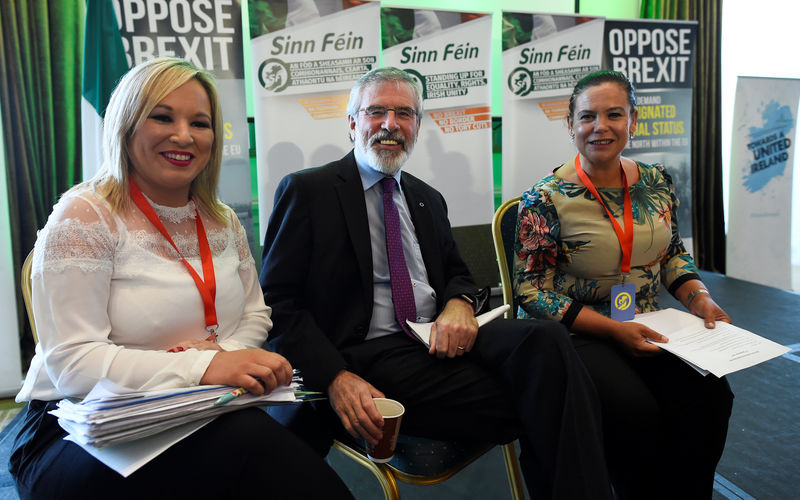By Padraic Halpin
DUBLIN (Reuters) - Sinn Fein President Gerry Adams said on Tuesday he would outline his succession plans in November as the former political wing of the Irish Republican Army (IRA) prepares to complete a generational shift in its leadership.
Adams, Sinn Fein leader for over 30 years, will seek re-election to the one-year post at the party's annual conference and set out his future plans at that time.
"I will be allowing my name to go forward for the position of Uachtaran Shinn Fein (President of Sinn Fein)," Adams said in a speech at a meeting of the party's lawmakers.
"And if elected I will be setting out our priorities and in particular our planned process of generational change, including my own future intentions."
Reviled by many as the face of the IRA during its campaign against British rule in Northern Ireland, Adams, 69 next month, reinvented himself as a peacemaker in the troubled region and then as a populist opposition lawmaker in the Irish Republic.
Around 3,600 people were killed during Northern Ireland's "Troubles", three decades of sectarian bloodshed between pro-British Protestant unionists and Catholic nationalists seeking a united Ireland that was ended by a 1998 peace agreement.
Whenever he decides to step down, he will almost certainly hand over to a successor with no direct involvement in the decades of conflict in Northern Ireland, say political analysts, making Sinn Fein a more palatable coalition partner in the Irish Republic where it has never been in power.
Deputy leader Mary Lou McDonald, who has been at the forefront of a new breed of Sinn Fein politicians transforming the left-wing party's image, is the clear favorite to take over.
Michelle O'Neill, another Sinn Fein lawmaker in her 40s, succeeded Martin McGuinness as leader in Northern Ireland shortly before the former IRA commander's death in March.
With McGuinness, Adams turned Sinn Fein into the dominant nationalist party in Northern Ireland and the third largest party south of the border.
Adams said last month that he intended to lead the party into the next parliamentary election in the Irish republic where suspicion of Sinn Fein's role in the Northern Ireland troubles still runs deep among the main political parties.

The far larger ruling Fine Gael and main opposition Fianna Fail, a more natural ally, have ruled out governing with Sinn Fein but analysts say a change of leader could soften that stance. The next election is expected in the next 12 months.